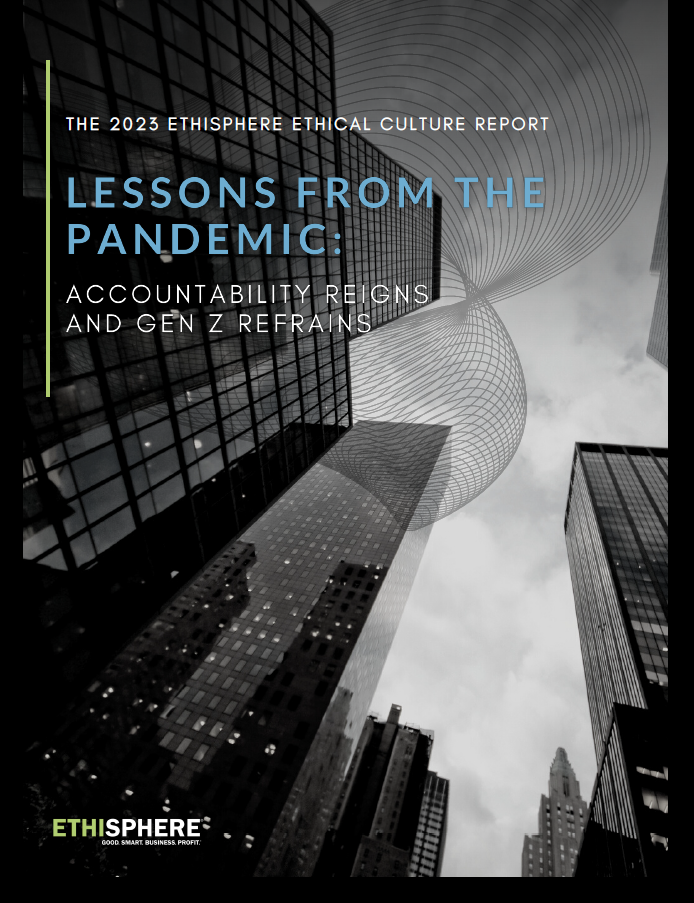Report Shows Significant Increase in Reports of Bullying in the Workplace, Importance of Training and Communication About Misconduct NEW YORK –
January 12, 2023 –
Ethisphere®, the global leader in defining and advancing the standards of ethical business practices, today unveiled the latest volume of its
2023 Ethical Culture Insights Report. The report derives insights produced from Ethisphere’s proprietary Ethical Culture Quotient (CQ) data set, which studies the elements of ethical culture, such as whether employees will report any ethical wrongdoings within their organization. Data for this report was collected from an Ethisphere survey of over two million global employees from Ethisphere’s client base between 2016 through the end of Q3 2022. The 54-question survey focused on reporting behavior and how the behavior reflected certain realities around organizational speak-up culture.
Key Findings from the Report:- Ethical culture within businesses increased across the board – Based on Ethisphere’s Eight Pillars of an Ethical Culture, respondents showed more favorable perceptions of their company’s ethical culture during the pandemic. Like all businesses, respondents faced greater turmoil during the last few years. But even amid such trying conditions, the culture of ethics they had in place before COVID-19 grew even stronger – helping to reduce risk, retain talent, and build value within their organizations. However, during the pandemic, although people became more willing to report misconduct and observed more of it, they tended to report it less.
- Claims of bullying increased significantly – In stark contrast to the other 26 types of reported misconduct, Ethisphere’s report found that bullying jumped a shocking 13 percent during the past few years. The report highlights several possible explanations for this significant increase, including the increasing presence of Gen Z employees, who as an age cohort report high levels of workplace bullying, as well as high levels of bullying in general. This increase also correlates with an increase in bullying during the pandemic, especially as people spent more time on-screen.
- Gen Z employees are least likely to report misconduct – While Gen Z represents a smaller portion of the data set from this research, it is interesting to note they are the least likely age group to report bad behavior. When compared to their Millennial, Gen X, and Boomer colleagues, 56 percent of Gen Z employees stated that they did not report misconduct when they saw it because they didn’t believe corrective action would be taken, followed by 47 percent who feared retaliation.
- Managers matter – More than half of respondents (56 percent) named their immediate manager as the avenue by which they reported misconduct, which aligns with prior Ethisphere cultural reports for being the most common method of reporting misconduct. This underscores the importance of businesses preparing their managers to facilitate discussions around raising concerns and proactively set corporate-wide expectations around what reporting, investigations, and actions will entail.
“Culture has become a topic of critical importance to every corporate stakeholder – employees, consumers, investors and regulators. At Ethisphere, sharing our data and expertise – so that all can learn and improve – is central to our mission,” said
Erica Salmon Byrne, Ethisphere’s chief executive officer. “Our latest report covers top trends from our global dataset, which has grown to over two million employee responses. With a number that large, we can do multiple demographic data cuts, including a pre-pandemic and pandemic era analysis, a generational analysis, and an update on the importance of managers. Why managers? Our data shows that 62 percent of employees who made a report say they took their concern to their manager. These front-line employees are critical to ensuring that an ethical culture is embedded across an organization and that reports are effectively addressed.”
Reporting MethodologyThe data in Ethisphere’s 2023 Ethical Culture and Compliance Perceptions Assessment derives from a confidential, online survey administered by Ethisphere from 2016 through the end of Q3 2022. Over two million employees from around the world responded to a 54-question survey focused on reporting behavior and how the behavior reflected certain realities around organizational speak-up culture, representing the views of employees across the Ethisphere’s global client base. Data classified as “pre-pandemic” was received prior to March 2020. Questions were presented using the framework of Ethisphere’s Eight Pillars of Ethical Culture and consisted of questions with Likert-scale “strongly agree” to “strongly disagree” response options, multiple select, and open comment questions. Participating companies were provided the ability to configure or remove survey questions. Further details on the reporting methodology can be found in the report.
Ethisphere’s Eight Pillars of Ethical CultureThe Eight Pillars of ethical culture that Ethisphere measures are:
- Awareness of Ethics and Compliance (E&C) Program and Resources
- Perceptions of the Effectiveness of the E&C Function – Training, Communications, etc.
- Observing and Reporting Ethical Misconduct
- Pressure to Compromise Standards to Meet Goals
- Organizational Justice – Perceptions of Wrongdoer Accountability Across Roles
- Manager Perceptions – Supervisor Conduct and Ability to Approach with Concerns
- Perceptions of Conduct, Values and Communications of Senior Leadership
- Perceptions of Values and Priorities Among Peers and Environment
These eight foundational pillars serve as a framework for systematically and objectively capturing employee sentiment on the formal and informal ethical systems of the enterprise. Developed by Ethisphere experts in collaboration with members of its
Business Ethics Leadership Alliance (BELA), each pillar is designed to provide insights that lead to clear action and remediation (or praise) where it is most needed. The report provides excellent takeaways for all companies, but also provides data that leaders can use to determine if their ethics programs are lacking and if they need additional help in building a strong culture.
Register for Ethisphere’s Webinar to Learn More!Join Ethisphere’s experts on January 19th from 1:00-2:00 PM EST for a deeper dive into the latest findings featured in this new report. The webinar, “Ethical Cultural Data Findings: Pandemic Lessons and a Path Forward,” will examine interesting insights from Ethisphere’s data set and discuss ways in which organizations can improve their ethical culture. Register today at:
https://ethisphere.com/event/ethical-culture-data-findings-pandemic-lessons-and-a-path-forward/.
About EthisphereEthisphere is the global leader in defining and advancing the standards of ethical business practices that fuel corporate character, marketplace trust, and business success. Ethisphere has deep expertise in measuring and defining core ethics standards using data-driven insights that help companies enhance corporate character. Ethisphere honors superior achievement through its
World’s Most Ethical Companies® recognition program, provides a community of industry experts with the Business Ethics Leadership Alliance (BELA), and showcases trends and best practices in ethics with
Ethisphere Magazine. Ethisphere also helps to advance business performance through data-driven assessments, guidance, and benchmarking against its unparalleled data: the Culture Quotient dataset focused on ethical culture and featuring the responses of 2+ million employees around the world; and the Ethics Quotient dataset, featuring 200+ data points highlighting the ethics, compliance, social, and governance practices of the World’s Most Ethical Companies. For more information, visit
https://ethisphere.com. ###
Media Contact:Anne Walker
VP, Media and Communications
[email protected]@Ethisphere 


